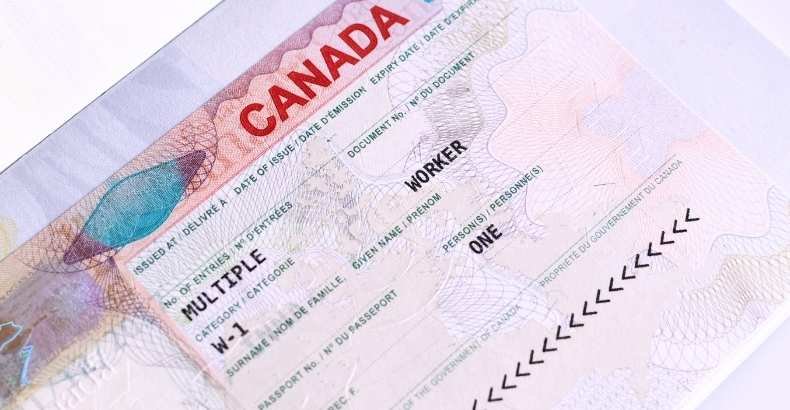Speaking at a conference can be an exciting experience, providing a platform to share insights and knowledge with a wider audience. However, there are several factors to consider, especially if you’re traveling internationally. This is where a question arises, “Does speaking at a conference require a work visa?”
Yes, speaking at a conference may require a work visa, depending on the host country and the nature of the event. Some countries categorize speaking engagements as work, especially if you’re being paid or promoting a business. Others may allow you to attend without a work visa if the conference is purely academic or non-commercial.
If you’re curious about this topic and want to learn more, this article covers everything you need to know. Keep reading to explore all the essential details about whether speaking at a conference requires a work visa and other key considerations.
What Does It Mean by Work Visa?
A work visa is a type of authorization that allows foreign nationals to enter a country for employment purposes. It permits individuals to work legally while they are in the host country, typically for a specific period or under specific conditions. Obtaining a work visa is essential for anyone who plans to engage in paid activities abroad, ensuring compliance with local laws.

Generally, a work visa specifies the terms and conditions under which the holder is allowed to work. This encompasses information about the job position, the employer, and the allowed length of stay. Following these requirements is essential to prevent any legal complications during your stay, as non-compliance may lead to penalties or removal.
For example, if you’re planning to attend a conference in Canada, knowing the various visa categories for Canadian conference visitors can provide better transparency. So, knowing which type of visa you need is vital to ensuring your participation in the event. This knowledge can help you complete the application process and fulfill any requirements related to your role at the conference.
Common Misconceptions About Work Visas
Widespread misunderstandings about work visas can cause confusion and mistakes during the application process. Being aware of these misunderstandings is vital for effectively managing the visa requirements. Addressing these errors can lead to an easier experience when seeking a work visa.
- Work Visas Are Only for Long-Term Employment: Many believe work visas are only needed for long-term jobs, but they are also required for short-term or temporary positions, including conferences and events.
- You Can Work Anywhere with a Work Visa: Some assume that a work visa allows employment in any job. However, it typically restricts you to working for the employer and position specified in the visa.
- A Tourist Visa Can Be Used for Work: It is a common misconception that a tourist visa can cover work activities. In reality, you need a specific work visa for any paid work or job-related activities.
- Work Visas Guarantee Job Security: Having a work visa does not guarantee job security or permanence. Your visa is tied to your employment status, so losing your job can affect your visa.
- All Work Visas Have the Same Requirements: Different work visas have varying requirements depending on the job, country, and visa type. It’s important to check specific requirements for your situation.
- Visa Approval Is Guaranteed If You Meet Requirements: Meeting visa requirements does not always guarantee approval. Applications can still be rejected based on additional factors or specific conditions.
- You Don’t Need to Follow Local Labor Laws: A work visa requires compliance with local labor laws, including work hours and wages. Ignoring these regulations can lead to legal issues and visa problems.
Recognizing and tackling these misunderstandings can simplify the visa application process. Staying informed helps prevent typical mistakes and guarantees that you fulfill all essential criteria for your work visa.
Does Speaking at a Conference Require a Work Visa?
Speaking at a conference can be an exciting opportunity, but there are important factors to consider before traveling internationally. Visa requirements vary from country to country and can be based on specific circumstances.

Nature of the Event
The type of conference you’re attending plays a crucial role in determining visa requirements. If it’s a purely academic, non-commercial event, certain countries might allow entry without a work visa. However, if the event has commercial or promotional elements, you may need a visa that covers professional activities.
Duration of Stay
How long you plan to stay can influence whether a work visa is necessary. Short-term visits, especially those lasting only a few days, may not always require a work visa. However, more extended stays might trigger stricter immigration requirements, particularly for business or professional activities.
Host Country Regulations
Each country has its own rules for work visas for conference speakers. For instance, working on a Canadian conference visa may involve requirements that differ from similar processes in other nations. Like many countries, Canada categorizes its visas based on the activities you’ll be performing, making it essential to research the specific visa type required for your destination.
Purpose of the Talk
If your speaking engagement is meant to promote your business or generate revenue, some countries may consider it “work” and require a work visa. However, if your role is solely academic or non-commercial, other visa categories may apply, potentially easing your visa requirements.
Invitation from the Conference Organizers
Receiving an official invitation from the conference organizers can sometimes influence the visa process. In some countries, having a formal invitation can help clarify whether you need a work visa or a general visitor visa, as it confirms your purpose for entering the country.
Citizenship and Current Visa Status
Your nationality plays a significant role in visa requirements. Certain countries have visa waiver programs or agreements that may simplify the process. Additionally, if you already hold a long-term visa for the country in question, it may allow you to speak at the conference without obtaining a new visa.
Sponsorship and Financial Support
If the conference organizers are covering your travel and accommodation, this might affect your visa application. Some countries may view financial sponsorship as a form of work, requiring a specific type of visa, even for short-term engagements.
Speaking at a conference involves careful planning, especially when crossing international borders. Researching and understanding the visa requirements can save you time and hassle, ensuring a smooth experience.
Common Challenges When Applying for a Work Visa
Applying for a work visa can be a complex process, with various steps and requirements. The application process can be made easier and more successful by understanding common challenges. Keep reading to explore key areas that may pose difficulties and how to address them.
Awareness Eligibility Requirements
One of the first challenges applicants face is determining their eligibility. Each country has specific requirements for work visas, such as skill sets, job offers, or educational qualifications. Ensure you meet these criteria to avoid application delays or denials by understanding them and meeting them.
Gathering Necessary Documentation
Documentation plays a key role in the visa application process. Applicants must often provide a range of documents, including job contracts, educational certificates, and identification proof. Missing or incorrect paperwork can cause significant delays or rejections, making thorough preparation essential.
Managing Complex Application Processes
Work visa applications often involve detailed forms and strict submission deadlines. Many applicants find the complexity overwhelming, especially when navigating government websites or dealing with application portals. Taking time to understand the process and ensuring all sections are completed accurately can help avoid complications.
Handling Language Barriers
For many applicants, language differences present a significant challenge. Official documents and application instructions are often in the language of the host country, which can be difficult for non-native speakers to understand. Seeking translation services or legal assistance can be valuable in these cases.
Dealing with Processing Delays
Work visa processing times differ, and unforeseen delays often happen. Applicants need to be ready for extended wait times caused by backlogs or extra security checks. Being aware of possible delays and preparing in advance can help lessen stress while waiting.
Applying for a work visa requires careful preparation. By becoming aware of these common challenges and addressing them early, applicants can improve their chances of a successful and timely outcome. Planning is key to reducing stress.
Tips for Securing Your Visa as a Conference Speaker
Securing a visa as a conference speaker requires attention to detail and careful planning. Being aware of the key steps involved can increase your chances of success. Below are practical tips to guide you through the process and help streamline your application.

- Double-Check Application Deadlines: Missing deadlines can cause unnecessary delays in securing your visa. Mark important dates in your calendar, and give yourself enough time to gather all required materials before submission.
- Consult with Your Conference Organizer: Event organizers can provide valuable details about the visa process related to the conference. Make sure to reach out to them for insights that could make your application easier.
- Keep Copies of Important Documents: Always keep photocopies of your submitted documents for future reference. This ensures you have a backup in case the originals get misplaced or if additional documents are requested.
- Ensure Proper Health Insurance Coverage: Many countries require proof of health insurance as part of the visa application process. Be sure to verify that your coverage meets the required criteria and have documentation ready.
- Prepare for Possible Interviews: Some visa applications require an interview as part of the process. Preparing for these interviews by gathering all necessary documents and practicing responses can boost your confidence.
- Stay Updated on Travel Restrictions: Check for any travel restrictions or visa requirements that may change due to international events. Staying updated helps avoid surprises or last-minute changes that could impact your plans.
- Seek Professional Guidance When Needed: If the visa process becomes overwhelming, consider seeking legal or professional assistance. Experts can offer valuable advice to ensure that your application is properly handled and avoid potential missteps.
Obtaining a visa as a conference speaker demands careful planning and attention to detail. By using these useful tips, you can help make your application process easier. Preparing in advance minimizes stress and increases your likelihood of success.
FAQs About Does Speaking at a Conference Require a Work Visa?
If you’re planning to speak at an international conference, you might have some important questions about visa requirements and procedures. Below, we’ve addressed some common inquiries to help clarify the process and ensure you’re fully prepared for your speaking engagement.
Is a Business Visa Enough for Conference Speaking?
In many countries, a business visa might be sufficient if you’re not being compensated for your speaking engagement. However, if your participation involves income or promotion of business activities, a work visa could still be required. Always check specific requirements for your host country.
Do I Need a Visa for Virtual Conference Speaking?
If you’re speaking at a conference virtually and not physically entering the host country, a visa is generally not required. However, you may still need to follow local tax and employment regulations depending on how your participation is compensated.
What Happens If I Speak at a Conference Without a Visa?
If you speak at a conference without the appropriate visa, you risk penalties, deportation, or being banned from future visits to the host country. Authorities can enforce strict measures for violating immigration laws, making it essential to obtain the correct visa.
Can I Apply for a Visa After Being Invited to Speak?
Yes, you can apply for a visa after receiving an invitation to speak at a conference. In fact, having an official invitation may help expedite the visa process. Make sure to apply well in advance to avoid any last-minute delays.
Does the Type of Conference Affect Visa Requirements?
Yes, the nature of the conference can impact visa requirements. Academic, non-commercial events may have different visa rules than corporate conferences. Countries often differentiate between these types when determining whether a work visa or visitor visa is necessary.
End Note
Knowing visa requirements for conference speakers is crucial when preparing for an international event. The required visa type can differ based on the country and your role. Making sure you have the correct visa helps prevent any issues.
So, does speaking at a conference require a work visa? In short, it depends. If you’re speaking at a commercial or business-related event, a work visa might be required. On the other hand, for academic or non-commercial conferences, a general visitor visa may suffice.
To ensure a smooth experience, plan ahead, check the host country’s visa requirements, and gather all necessary documents. By being prepared, you can focus on your presentation without any last-minute stress. Best of luck with your conference!